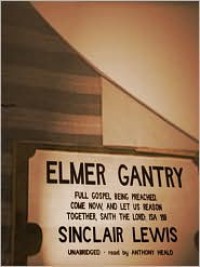Currently reading
Inherent Vice
The Best Horror of the Year Volume Five
Locus Solus (Alma Classics)
Blackout (Newsflesh Trilogy, #3)
Elmer Gantry
 If you've ever laughed at (or been disgusted by) the antics of televangelist charlatans like Jim Bakker and Jimmy Swaggart, Sinclair Lewis had their number 80 years ago. The fictional Elmer Gantry rises to prominence before the era of radio and TV evangalism, but his greed, self-serving political ambitions, and sexual indiscretions are just like those of his real-life counterparts.
If you've ever laughed at (or been disgusted by) the antics of televangelist charlatans like Jim Bakker and Jimmy Swaggart, Sinclair Lewis had their number 80 years ago. The fictional Elmer Gantry rises to prominence before the era of radio and TV evangalism, but his greed, self-serving political ambitions, and sexual indiscretions are just like those of his real-life counterparts.I actually listened to part of this audiobook while mistakenly thinking the author was Upton Sinclair. Duoh! How embarrassing. Besides having similar names, the authors were contemporaries who wrote about similar topics in the same time period, and their style is similar as well, though Lewis is a bit more satirical while Sinclair is more pedagogical. But both of them write bitingly about the foibles of early 20th century America.
Elmer Gantry follows the protagonist from his beginnings as an irreverent student at a religious university who's basically browbeaten into being "saved" by another traveling preacher who turns out to be a cynical fraud himself. But Elmer is set out on his path, and goes to seminary to become a Baptist preacher. After getting caught with one of his flock, he's kicked out by the Baptists. He becomes assistant (and lover) to a crazy woman evangelist named Sharon Falconer, who on the one hand is as phony as he is, and on the other seems to really believe every bit of nonsense she spouts. Her character was quite interesting; today we'd probably call her bipolar, and she seems to be the one woman Elmer truly loves, as he remembers her for the rest of his life, even when he moves on to bigger and better venues after losing her.
He spends a little time doing whacky New Age spirituality and "self-help" seminars (yes, this stuff was going around 80 years ago too) before he manages to con himself into the Methodist church, and pretty soon he's a minister. From there he keeps moving on to bigger and bigger churches, becoming more and more powerful, and always as hypocritical, self-centered, greedy, and rapacious as ever.
This was a great story for its study of hypocrisy and very cynical and realistic examination of religion in America. (Sinclair did his homework, sitting in on a lot of church services to write this.) It's not exactly an indictment of Christianity and shouldn't be taken that way -- the novel doesn't take a stand on the rightness or wrongness of any particular religious beliefs, only on the all-too-realistic behavior of the clergy and parishioners. Sinclair writes a straightforward story with lots of minor characters, each of them very human and flawed and interesting. By the end of the book, you're really, really hoping that Elmer Gantry will finally get his comeuppance, but despite many close calls and setbacks over the course of his career, Gantry is like an eel who always seems to wriggle his way out of the worst of his difficulties.
I recommend this highly as American literature set in the same time period as the novels of Upton Sinclair and F. Scott Fitzgerald.




